

Www.holisticeducator.com/rote.htm. Link: rote learning BRAIN-ANTAGONISTIC TEACHING METHODS: rote memorisation Theme: In the framework of the traditional teaching paradigm, most teaching is done with a view to predetermined outcomes such as successful 'performance' on tests which emphasize the acquisition of data through memorization of factual material and isolated information i.e. 'rote learning'.
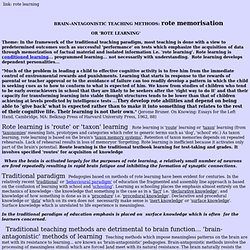
Rote learning is conditioned learning... programmed learning... not necessarily with understanding. Rote learning develops dependent personalities... Memorization Techniques. Learning a new skill, language or even trying to remember a grocery list does not have to be difficult when you use these tips and techniques that are used to commit something to memory.
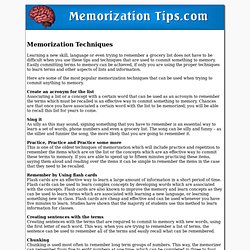
Easily committing terms to memory can be achieved, if only you are using the proper techniques to learn terms and other aspects of lists and information. Here are some of the most popular memorization techniques that can be used when trying to commit anything to memory. Create an acronym for the list Associating a list or a concept with a certain word that can be used as an acronym to remember the terms which must be recalled is an effective way to commit something to memory.
Chances are that once you have associated a certain word with the list to be memorized; you will be able to recall this list for years to come. Sing it As silly as this may sound, signing something that you have to remember is an essential way to learn a set of words, phone numbers and even a grocery list. The Learning Center: Memorization Techniques.
You never forget.

With the exception of injury and disease, the brain never loses anything. Forgetting is either 1) the failure to store information in the first place, or 2) the inability to retrieve the information, or 3) the failure to store it in such a way that it can be found when needed. Remembering and forgetting are fairly big issues in academics. Experiments suggest that we forget all kinds of information all of the time. Although there are several theories which attempt to explain forgetting, much about the neurobiology of the brain remains unknown.
Short term memory has a limited capacity and information disappears fast unless you can shift it into long term memory. Memory has two parts: Concentration (you have to get it before you can forget it) and Recall. In class and while studying: Pay attention to get information right the first time. MNEMONIC TECHNIQUES AND SPECIFIC MEMORY Tricks to improve memory, memorization memorization memorize method memorizing creative memory technique virtual memory memory loss human memory book game management improvement photographic long term memory me. Mnemonic techniques are more specific memory aids.
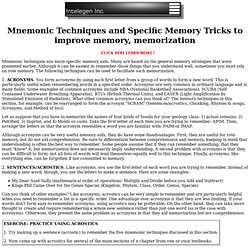
Many are based on the general memory strategies that were presented earlier. Although it can be easiest to remember those things that you understand well, sometimes you must rely on rote memory. The following techniques can be used to facilitate such memorization. 1. ACRONYMS. Let us suppose that you have to memorize the names of four kinds of fossils for your geology class: 1) actual remains, 2) Petrified, 3) Imprint, and 4) Molds or casts. Although acronyms can be very useful memory aids, they do have some disadvantages. 2. My Dear Aunt Sally (mathematical order of operations: Multiply and Divide before you Add and Subtract) Kings Phil Came Over for the Genes Special (Kingdom, Phylum, Class, Order, Genus, Species)
Memorization - Study Skills Library - Cal Poly. How we Remember Memory itself probably cannot be developed; however, improvement in remembering comes from correcting certain habits or thoughts so that we use our memory to its’ fullest potential.
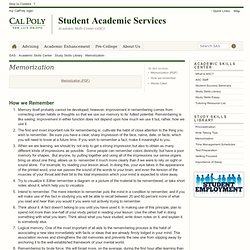
Remembering is like seeing; improvement in either function does not depend upon how much we use it but, rather, how we use it. The first and most important rule for remembering is: cultivate the habit of close attention to the thing you wish to remember. Be sure you have a clear, sharp impression of the face, name, date, or facts, which you will need to know at a future time. How to Memorize - Learn to memorize and increase memory. If you are visiting from StumbleUpon and like this article and tool, please consider giving it a thumbs up.
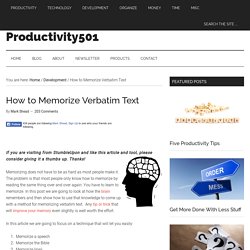
Thanks! Memorizing does not have to be as hard as most people make it. The problem is that most people only know how to memorize by reading the same thing over and over again. You have to learn to memorize. In this post we are going to look at how the brain remembers and then show how to use that knowledge to come up with a method for memorizing verbatim text. In this article we are going to focus on a technique that will let you easily: Memorize a speechMemorize the BibleMemorize linesMemorize Scripture At the end of this article is a Javascript tool that makes it easy to implement this method.
Synapses and Neurons and How to Memorize In the simplified model of the brain in this discussion, we’ll be looking at neurons and synapses. When you remember something neurons fire signals down particular synapse pathways to other neurons which in turn fire signals to other neurons. Memory Techniques, Memorization Tips. Memory Improvement Techniques - Improve Your Memory with MindTools. © VeerPRZEMYSLAW PRZYBYLSKI Use these techniques to improve your memory. The tools in this section help you to improve your memory.